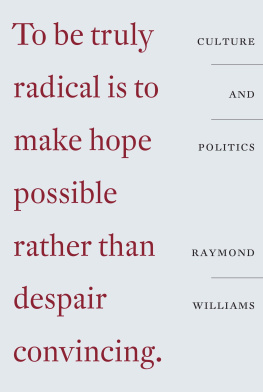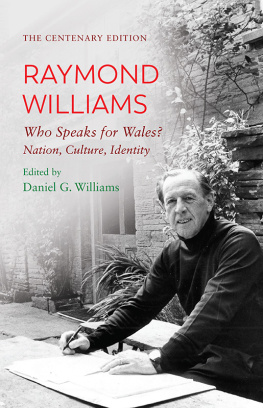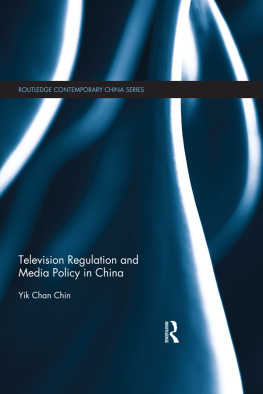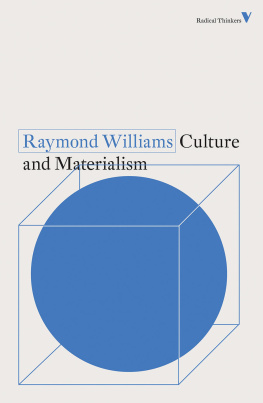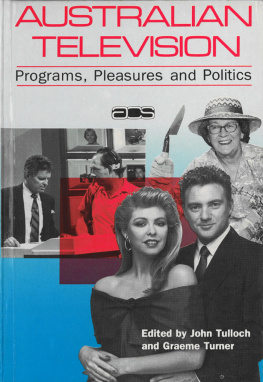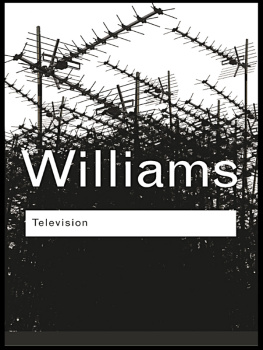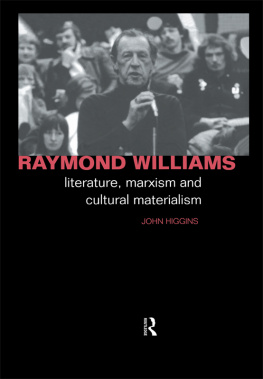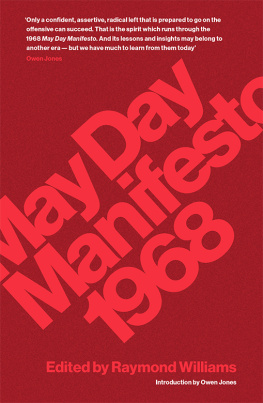Routledge Revivals
Raymond Williams on Television
First Published in 1989, this work is based around a monthly TV column which Raymond Williams wrote for The Listener between 1968 and 1972. Those were the years of the Prague Spring, of anti-Vietnam war demonstrations, of fighting in Cambodia and Northern Ireland, of hope for McGovern in the United States and attacks on the Wilson Labour Government in Britain. In The Listener articles Williams comments on all of these events, providing a rare glimpse not only into the events of his daily life but also into the continuing development of a personal sociology of culture.
The articles also discuss such television forms as detective series, science programmes and sports, travelogue, education, gardening, and childrens programming. The book also includes Williams key lecture Drama in a Dramatised Society, which sets a framework for his analysis; a London Review of Books piece on the Falklands/Malvinas adventure as a tele-war; and an interview with Williams on television and teaching.
Cited by The Guardian as The foremost political thinker of his generation, Williams writing amounts to a primer on ways of watching television and of critiquing its profound social and political impact.
Raymond Williams on Television
Selected Writings
Edited by
Alan OConnor
First published in 1989
by Routledge
This edition first published in 2011 by Routledge
2 Park Square, Milton Park, Abingdon, Oxon, OX14 4RN
Simultaneously published in the USA and Canada
by Routledge
711 Third Avenue, New York, NY 10017
Routledge is an imprint If the Taylor & Francis Group, an informa business
Preface and articles 1989 Estate of Raymond Williams
Introduction 1989 Alan OConnor
All rights reserved, No part of this book may be reprinted or reproduced or utilised in any form or by any electronic, mechanical, or other means, now known or hereafter invented, including photocopying and recording, or in any nformation storage Of retrieval system, without permission in writing from the publishers.
Publishers Note
The publisher has gone to great lengths to ensure the quality of this reprint but points out that some imperfections in the original copies may be apparent.
Disclaimer
The publisher has made every effort to trace copyright holders and welcomes correspondence from those they have been unable to contact.
A Library of Congress record exists under ISBN: 041502627X
ISBN 13: 978-0-415-50920-6 (hbk)
ISBN 13: 978-0-203-12493-2 (ebk)
RAYMOND WILLIAMS ON TELEVISION
Till the eyes tire, millions of us watch the shadows of shadows and find them substance; watch scenes, situations, actions, exchanges, crises. The slice of life, once a project of naturalist drama, is now a voluntary, habitual, internal rhythm; the flow of action and acting, of representation and performance, raised to a new convention, that of a basic need.
Raymond Williams
RAYMOND WILLIAMS ON TELEVISION
SELECTED WRITINGS
Edited by Alan OConnor
Preface and articles Estate of Raymond Williams 1989
Introduction Alan OConnor 1989
First published in 1989 by:
Routledge
a division of Routledge, Chapman and Hall
29 West 35th Street, New York NY 10001
and
Routledge
a division of Routledge, Chapman and Hall
11 New Fetter Lane, London EC4P 4EE
Cover design by Goodness Graphics, Toronto, Ontario, Canada
Photograph by Camera Press Ltd., London, England
Printed in Canada
We gratefully acknowledge permission to reprint the following articles:
Drama in a Dramatised Society, Cambridge University Press;
Distance, London Review of Books; Television and Teaching: An Interview with Raymond Williams, Society for Education in Film & Television Limited; all others, The Listener
Alan OConnor thanks Dinah Forbes and Robert Clarke of Between
The Lines (Toronto), without whom this book would not exist in its present form.
All rights reserved. No part of this book may be reprinted or reproduced or utilized in any form or by any electronic, mechanical, or other means, now known or hereafter invented, including photocopying and recording, or in any information storage or retrieval system, without permission in writing from the publishers.
British Library Cataloguing in Publication Data
Raymond Williams on Television 1921-1988.
1. Society. Effects of Television
I. Title II. OConnor, Alan
302.2345
ISBN 0-415-02627-X
Library of Congress Cataloging in Publication Data
applied for
ISBN 0-415-02627-X
Contents
Preface
It was a busy and fortunate time. Before I began writing about televi-sion I had been an active occasional participant. The first time I appeared was on the lively magazine programme Tonight, in the late 1950s. I was there to question the author of an educational report. An enthusiastic producer asked me to begin the discussion by taking the printed report and tearing it up. That would be real television, he said. It would also be vandalism, I had to reply. Soon afterwards I was learning the extraordinary experience of answering an interviewers questions still by habit speaking to him rather than to the actual audience while in fact he, off camera, had his head bowed over his clipboard, rehearsing his next question. Or there was the uncertain passage between the informality of the hospitality room and the relative formality of the studio. I was booked to engage in a fierce head-to-head discussion with the Chairman of a large newspaper group. It was all smiles and chat until we were seated knee-to-knee under the lights and he leaned over and said No holds barred, right? I saw none of all this on the screen, since most discussions were live, but I was beginning to understand the atmosphere of this rapidly expanding institution.
Before the end of the 1960s I had taken part in innumerable discussions, live and recorded. For some years the BBC used to send a car to take me from Cambridge and return me in the small hours. I went on location in Wales to film my play Public Inquiry. I attended as author the live transmission, still then practised to give the immediacy of theatre, of another play, A Letter from the Country. In the late Sixties I worked for many weeks with Nicholas Garnham on a personal documentary in the series One Pair of Eyes.
Most though not all of that work has now gone into thin air.Yet what interests me most, looking back, is that though I was involved in these ways in the new medium almost all my writing about communications was still about print. There is one incidental reason. My book Communications, written in 1961, was almost entirely based on work done in adult education classes while I was still an extra-mural tutor. But then also in 1961 I had moved to internal university teaching at Cambridge and there was no room on any available course for work of this kind in any medium. By the end of the Sixties I was giving courses on film but these were not part of the syllabus. Large numbers of students attended but could not use any of this work in examinations.


